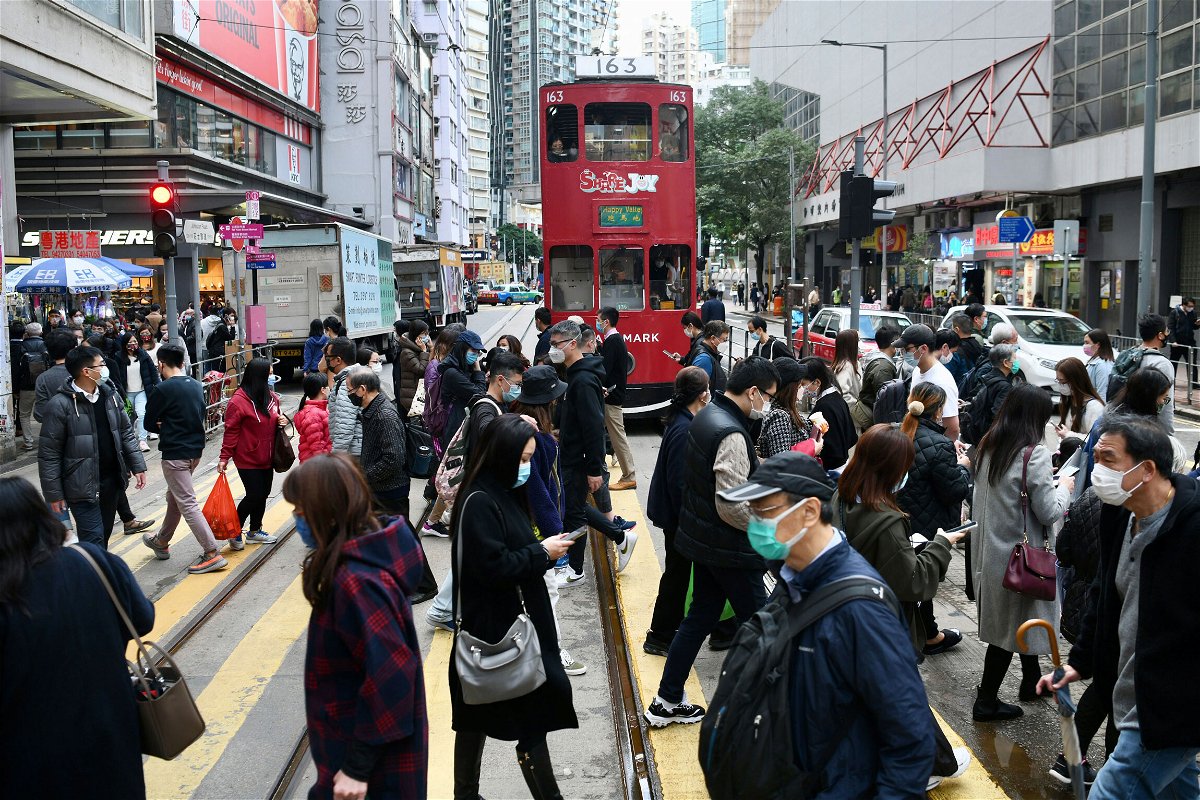Hong Kong reports first Omicron cluster as city welcomes New Year

People wearing face masks cross a street in Hong Kong on December 21.
By Jessie Yeung, CNN
Hong Kong has confirmed its first Omicron cluster, bringing an end to its long streak of zero locally transmitted cases and prompting fears of a wider outbreak as the city prepares to ring in the new year.
Two cases of local transmission were detected on Thursday — a 76-year-old and a 34-year-old, both fully vaccinated with no recent travel history. They tested preliminarily positive for Covid-19 after eating at a restaurant on Monday, where they were exposed to an air crew member who was later confirmed to be carrying the highly transmissible Omicron variant, authorities say.
The crew member, an employee of Cathay Pacific, the city’s flagship carrier, arrived in Hong Kong from the United States on Christmas Day. He had tested negative twice, before testing preliminarily positive for Omicron on Tuesday. He is fully vaccinated with a third booster shot of the Pfizer vaccine and remains asymptomatic, according to the Department of Health.
Health authorities announced Friday they are also monitoring 19 new cases, mostly imported and all suspected to be Omicron — including a cargo pilot who visited several popular restaurants and bars on Monday, just days after returning from the US. On Tuesday he was determined to be a close contact of another patient and sent to the government’s quarantine center; by Wednesday, he had tested positive for the virus.
Hong Kong hasn’t seen a locally transmitted Covid case with an unknown source for nearly three months; the last such reported case was on October 8. Though the city had reported a number of imported Omicron cases from quarantined overseas travelers in December, the variant hadn’t broken to the local community until now.
“There are now imported cases that found their way into the community, leading to a cluster of infections. This latest development is extremely worrying,” said Sophia Chan, the Secretary for Food and Health, in a news conference on Friday.
She added that authorities were now preparing for an impending fifth wave, and urged the public not to congregate in crowded areas for New Year celebrations. “The next two weeks will be a crucial period to keep out Omicron. This is really critical,” she said.
On Thursday night, authorities locked down the residential buildings where the 76-year-old and 34-year-old lived, and launched a mass testing campaign for anybody who had recently visited the premises. The testing covers 60 other premises across the city, with residents only allowed to leave “restricted areas” after presenting proof of a negative test result.
The restaurant where the two patients dined has also been closed for cleaning, disinfecting and other measures to improve airflow, said the Center of Health Protection.
“The government has remained vigilant and has been closely monitoring the latest scientific data on mutant strains as well as the epidemic situation of various places,” said a CHP spokesperson in a statement. “The most stringent anti-epidemic measures will be implemented to prevent the mutant strain from spreading in the local community.”
Hong Kong is one of the few places around the world still using a zero-Covid approach — meaning it aims to stamp out all Covid cases within its borders. To that end, the city has one of the world’s strictest border control and quarantine programs. This week, as the threat of Omicron loomed, authorities tightened quarantine restrictions further for air crew — prompting Cathay Pacific to cancel a number of passenger flights to and from Hong Kong through the first quarter of 2022, and suspend long haul cargo flights into the city for one week.
But the sustainability of this approach has been called into question in recent months, with several other places such as Australia and New Zealand abandoning the zero-Covid model in favor of “living with Covid.” In mainland China, the world’s largest zero-Covid holdout, increasingly frequent and widespread outbreaks have challenged the approach — as do Hong Kong’s latest cases.
Hong Kong’s vaccination rate has lagged behind other developed nations, with less than 70% of the population fully vaccinated so far. All year, authorities have struggled to encourage higher vaccination rates — particularly among the reluctant elderly, the most vulnerable population.
“We have to prepare for the worst because we don’t actually know how many got infected in the end because of this case,” said Leo Poon, head of Hong Kong University’s Public Health Laboratory Sciences division, on Friday. “Omicron is spreading all around the globe, in Europe, in the Americas, and and also probably sometime in the future in Asia.”
He added that the zero-Covid strategy was still viable for now because Hong Kong only has a few cases. The last few months of no local cases proves that “the screening mechanism here is quite effective,” he said.
However, it’s a trade-off, he said — tighter restrictions might prevent Covid from entering the city, but at the cost of heavily disrupting the economy, flow of goods, people’s ability to travel, and other aspects of daily life. And, he added, “now that we just come up with a more challenging (variant), that means we may have to fine tune our control policy.”
The-CNN-Wire
™ & © 2022 Cable News Network, Inc., a WarnerMedia Company. All rights reserved.